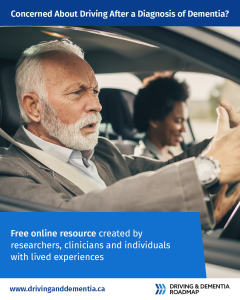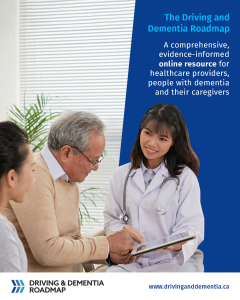Toronto, ON – October 19, 2022 – The Driving and Dementia Roadmap, a first-of-its-kind, free, online resource launched across Canada to empower older adults living with dementia to make informed decisions about when to stop driving.
“At some point of disease progression, individuals living with dementia need to consider whether or not it is safe for them to continue driving. However, not being able to drive can result in a loss of independence for many older adults, making the decision to stop driving a difficult one. With the Alzheimer Society of Canada predicting that nearly one million Canadians will be living with dementia by the year 2030, more individuals and their families will soon be facing this challenge and need support,” says Dr. Howard Chertkow, Scientific Director of the Canadian Consortium on Neurodegeneration in Aging (CCNA) and Director of the Kimel Family Centre for Brain Health and Wellness at Baycrest.
Alzheimer Society of Canada predicting that nearly one million Canadians will be living with dementia by the year 2030, more individuals and their families will soon be facing this challenge and need support,” says Dr. Howard Chertkow, Scientific Director of the Canadian Consortium on Neurodegeneration in Aging (CCNA) and Director of the Kimel Family Centre for Brain Health and Wellness at Baycrest.
Researchers from Baycrest, Sunnybrook Health Sciences Centre, and CCNA have developed the Driving and Dementia Roadmap to address this challenge. Launched among leading experts in dementia during a recent CCNA national conference, this unique resource brings together information, videos, worksheets and other materials to help navigate the decision in a way that honours the individual while involving their family or close community.

“This is one-of-a-kind Canadian resource that provides strategies to help individuals manage the emotional and practical aspects of the decision to stop driving,” says Dr. Mark Rapoport, geriatric psychiatrist, researcher and acting head of Geriatric Psychiatry at Sunnybrook. “The website addresses common concerns about a loss of independence or identity and can also help individuals make a plan to continue with their daily activities, even if they’re not driving anymore.”
Information in the Driving and Dementia Roadmap is tailored to three groups: older adults diagnosed with dementia, caregivers of people with dementia, and healthcare professionals. The Roadmap is available at drivinganddementia.ca and includes resources from every province and territory.
“Among many other topics, the Driving and Dementia Roadmap helps users understand how dementia can impact driving; identify when it becomes unsafe for individuals living with dementia to drive; and adjust to life without driving once the decision has been made,” says Dr. Gary Naglie, geriatrician, researcher and Vice-President, Medical Services & Chief of Staff at Baycrest.
drive; and adjust to life without driving once the decision has been made,” says Dr. Gary Naglie, geriatrician, researcher and Vice-President, Medical Services & Chief of Staff at Baycrest.
The DDR does not incorporate information from individuals and provide them with a recommendation to continue or stop driving. The DDR is for educational and informational purposes and is not a substitute for professional medical guidance, diagnosis, treatment or care. For personal advice, patients and families are strongly encouraged to reach out to a qualified healthcare provider.
is not a substitute for professional medical guidance, diagnosis, treatment or care. For personal advice, patients and families are strongly encouraged to reach out to a qualified healthcare provider.
The Driving and Dementia Roadmap was developed by CCNA’s Team 16, led by Drs. Naglie and Rapoport with funding from the Canadian Institutes of Health Research (CIHR), and in partnership with the University of Toronto Faculty of Medicine. Team 16 is a Canada-wide research team comprised of academics and clinicians focused on creating interventions and developing knowledge to support people with dementia through the driving cessation process. Additional funding and developmental support came from the Centre for Aging + Brain Health Innovation (CABHI) and the Ontario Ministry of Health Academic Health Sciences Centres Alternative Funding Plan Innovation Fund.
